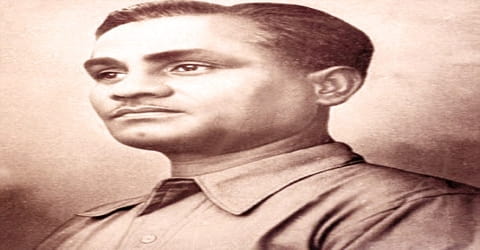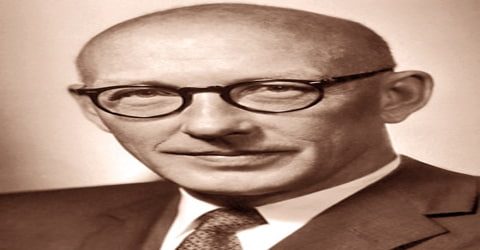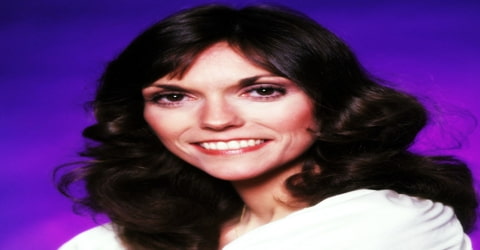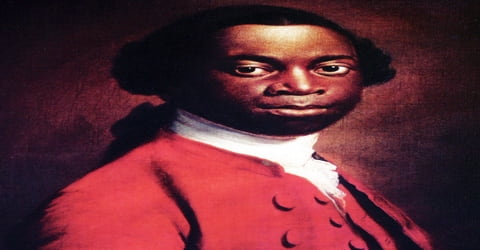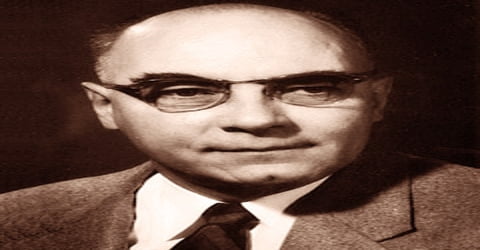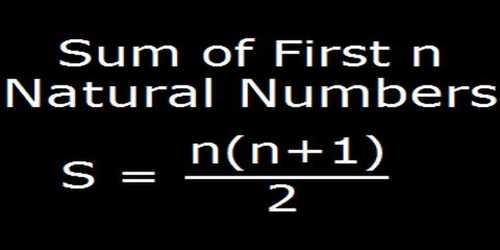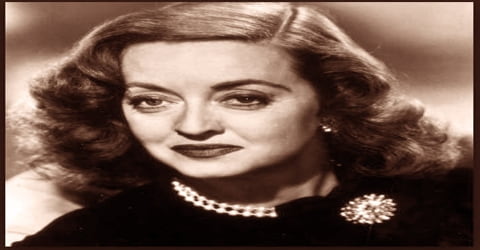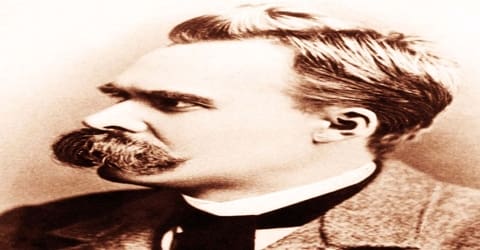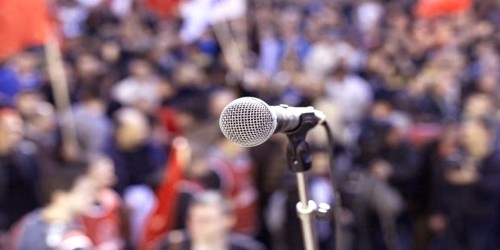Biography of Dhyan Chand
Dhyan Chand – Indian hockey player.
Name: Dhyan Chand
Date of Birth: 29 August 1905
Place of Birth: Allahabad, United Provinces of Agra and Oudh, British India
Date of Death: 3 December 1979 (aged 74)
Place of Death: Delhi, India
Occupation: Athlete
Father: Sameshwar Dutt Singh
Mother: Sharadha Singh
Spouse/Ex: Janaki Devi
Early Life
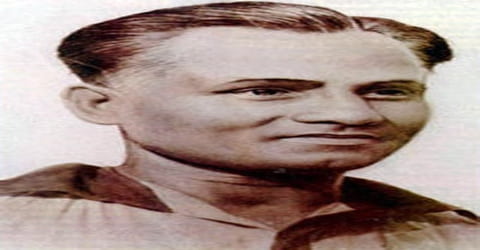
Dhyan Chand, Indian field hockey player who was considered to be one of the greatest players of all time, was born on 29 August 1905 in Allahabad, India, in a Rajput family. He was known for his extraordinary goal-scoring feats, in addition to earning three Olympic gold medals, in 1928, 1932 and 1936, during an era where India dominated field hockey. His influence extended beyond these victories, as India won the field hockey event in seven out of eight Olympics from 1928 to 1964. It is believed that after India defeated Germany in the 1936 Olympics final 8–1, Adolf Hitler offered him a senior post in the German Army, to which Chand refused.
A sportsman beyond compare, his goal-scoring feats were simply out of the world. So much so that he was called “The Wizard” for his uncanny hockey talents! He exercised tremendous control over the ball and was an expert at dribbling. In fact, his dribbling skills were so unbelievable that his fans fondly called him a magician with a stick. Opposition teams often broke open his stick to check if there was something special inside it. Initially, he played for the Army teams where he made a name for himself. He was captain of an Indian hockey team that went on to win a gold medal in the 1936 Berlin Olympics and was part of the earlier two Olympic Gold medal winning hockey teams, i.e., 1928 Amsterdam Olympics and 1932 Los Angeles Olympics.
Known as The Wizard or The Magician of hockey for his superb ball control, Chand played internationally from 1926 to 1949; he scored 570 goals in 185 matches according to his autobiography, Goal. The Government of India awarded Chand India’s third highest civilian honor of Padma Bhushan in 1956. His birthday, 29 August, is celebrated as National Sports Day in India every year.
Dhyan Chand is most remembered for his goal-scoring feats and for his three Olympic gold medals (1928, 1932, and 1936) in field hockey, while India was dominant in the sport. He joined the Indian army in 1922 and came to prominence when he toured New Zealand with the army team in 1926. After playing in the 1928 and 1932 Olympic Games, Chand captained the Indian team at the 1936 Games in Berlin, scoring three goals in the 8–1 defeat of Germany in the final match. During India’s victorious world tour of 1932, he scored 133 goals. Known as “the Wizard” for his superb ball control, Chand played his final international match in 1948, having scored more than 400 goals during his international career.
Childhood, Family and Educational Life
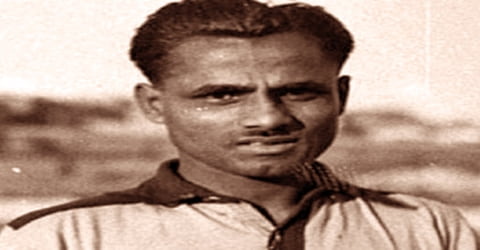
Dhyan Chand was born on the 29th of August 1905 at Prayag (Allahabad), Uttar Pradesh to a Bais Rajput family. He was the elder brother of another hockey player Roop Singh. His parents are Sharadha Singh and father Sameshwar Singh. His father was in the British Indian Army, and he played hockey in the army. Dhyan Chand had two brothers Mool Singh and Roop Singh. Because of his father’s numerous army transfers, the family had to move to different cities and as such Chand had to terminate his education after only six years of schooling. The family finally settled in Jhansi, Uttar Pradesh, India. Dhyanchand graduated from Victoria College, Gwalior in 1932. Being in the military, his father got a small piece of land for a house.
He could get only six years of schooling as his family had to move from one city to another continually because of the transferable nature of his father’s job. He loved to wrestle as a youngster though he was not much inclined towards other sports.
Personal Life
Dhyab Chand married Janaki Devi in 1936 and had seven sons with her.
The last years of this sporting legend were unfortunately spent in misery. Largely forgotten and short of money, he became very disillusioned with life.
Career and Works
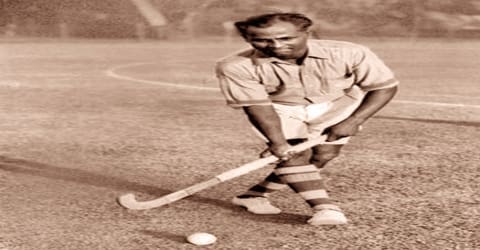
In his younger days, Dhyan Chand was not much interested into sports although he liked wrestling a lot. He started playing Hockey with his friends who used to themselves make Hockey sticks from tree branches and balls from ragged clothes. At the age of 14 years, he visited a Hockey match with his father, where one team was down by 2 goals. He insisted his father to play from the losing side, and when an Army Officer let him do so, Dhyan scored 4 goals for the team. Impressed by his skills, the Officer offered him to join the army and at the age of 16 years, Dhyan was inducted into the Punjab Regiment as a Sepoy in the year 1922. Subedar-Major Bhole Tiwari of Brahmin Regiment became Dhyan’s mentor inside the Army and taught him the basics of the game. Pankaj Gupta was the first Coach of Dhyan Singh who predicted that one day he would shine like the Moon, called Chand in Hindi. Hence, Dhyan Singh came to be known as Dhyan Chand after that.
A reorganization of the army that year resulted in the 1st Brahmans becoming the 1/1st Punjab Regiment. Between 1922 and 1926, Chand exclusively played army hockey tournaments and regimental games. Chand was ultimately selected for the Indian Army team which was to tour New Zealand. The team won 18 matches, drew 2 and lost only 1, receiving praise from all spectators. Following this, in the two Test matches against the New Zealand squad, the team won the first and narrowly lost the second. Returning to India, Chand was promoted to Lance Naik in 1927.
Dhyan Chand delivered a brilliant performance in the first Inter-Provincial (National) Hockey tournament that was organized in the year 1925. Five teams, viz. United Provices (UP), Punjab, Bengal, Rajputana, and Central Provinces participated in the tournament. On the basis of his performance in the tournament, he was selected for the International Hockey team of India. After successfully lobbying for reintroducing field hockey in the Olympics, the newly formed Indian Hockey Federation (IHF) made preparations to send its best possible team for the 1928 Amsterdam Olympics.
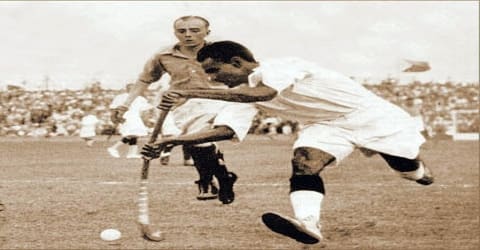
Due to his skills, Chand was selected to play in the Indian Army Team which was to tour New Zealand in 1926. His team won 18 matches out of 21 in the tournament and Dhyan Chand was greatly appreciated for his performances. He was promoted to Lance Naik upon his return to India.
During the tour, the Indian team scored 20 goals in a match played at Dannkerke, and Dhyan Chand alone had scored 10 of them. India played 21 matches on the tour, out of which it won 18, lost 1 and drew 2 matches. The team scored a total number of 192 goals and Dhyan Chand alone had scored over 100 of them. After his return to India, he was promoted to the post of Lance Nayak in the Army. At the London Folkstone Festival in 1927, he scored 36 goals out of India’s total 72 goals, in 10 matches played at the event. He played for the Indian Hockey team in the Amsterdam Olympic Games 1928, and scored 2 out of the 3 goals in the final match against the Netherlands, getting India the Gold Medal by a 3-0 win.
Field hockey was reintroduced in the 1928 Amsterdam Olympics and the Indian Hockey Federation (IHF) wanted to send its best team for the event. Dhyan Chand with his great performance in the inaugural nationals secured a place in the team. The Indian team went to Amsterdam and beat the Dutch, German and Belgian teams in the pre-Olympic matches by huge margins.
On 17 May the Indian national hockey team made its Olympic debut against Austria, winning 6–0, with Chand scoring 3 goals. The next day India defeated Belgium 9–0; however, Chand only scored once. On 20 May, Denmark lost to India 5–0, with Chand netting 3. Two days later, he scored 4 goals when India defeated Switzerland 6–0 in the semi-finals. The final match took place on 26 May, with India facing the home team of the Netherlands. The Indian team’s better players Feroze Khan, Ali Shaukat and Kher Singh were on the sick list and Chand himself was ill. However, even with a skeletal side, India managed to defeat the hosts 3–0 (with Singh scoring 2), and the Indian team won its country’s first Olympic gold medal. Chand was the top scorer of the tournament, with 14 goals in 5 matches. A newspaper report about India’s triumph said,
“This is not a game of hockey, but magic. Dhyan Chand is, in fact, the magician of hockey.”
On returning to India, the team was received by thousands of people at the Bombay harbor, compared to the three people who had seen them off.
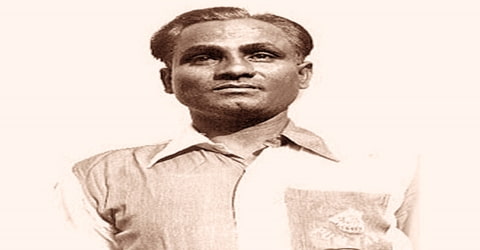
In the Los Angeles Olympics 1932, the Indian team led by Lal Shah Bukhari again won the Gold Medal. In the tournament, the Indian Hockey team defeated the USA Hockey team by 23-1, which remained a world record until it was broken in the year 2003. Out of these 23 goals, 8 were scored alone by Dhyan Chand. In the event, Dhyan Chand scored 12 goals for India in 2 matches.
After the Olympics, the team went on an international tour covering the United States, England, and several other countries. By the end of the tour, India had won 34 matches out of 37 with Chand scoring 133 of the 338 goals scored by India.
In 1933, Chand’s home team, the Jhansi Heroes, he participated in and won the Beighton Cup, which he considered the most prestigious of Indian hockey tournaments. Later, he would state,
“If anybody asked me which was the best match that I played in, I will unhesitatingly say that it was the 1933 Beighton Cup final between Calcutta Customs and Jhansi Heroes. Calcutta Customs was a great side those days; they had Shaukat Ali, Asad Ali, Claude Deefholts, Seaman, Mohsin, and many others who were then in the first flight of Indian hockey.
I had a very young side. Besides my brother Roop Singh, and Ismail, who played for the Great Indian Peninsular Railway in Mumbai, I had no other really great player on the team. But I had a team which was determined to do or die. It was a great match, full of thrills, and it was just opportunism that gave us the victory. Customs were pressing hard and our goal was at their mercy. Suddenly I broke through and from midfield gave a long through pass to Ismail, who ran with Jesse Owens’ speed half the length of the ground. A misunderstanding occurred between the Customs left-half and the goalkeeper, and Ismail, taking every advantage of it, cut through and netted the only goal of the match. We felt very proud of our triumph.”
In the Berlin Olympics 1932, Indian had successfully made their path to the finals crushing Hungary by 4-0, the USA by 7-0 and Japan 9-0 without conceding a single goal in the tournament. The team defeated France in the Semi-Finals by 10 goals and was going to combat Germany in the Finals. In the Final match, the Indian squad could score only 1 goal till the interval. Dhyan Chand removed his shoes in the interval and played the match barefooted onwards. The Indian team won the match and the Gold medal by 8-1.
Chand was made the captain of the Indian hockey team in 1934 and he led the team to the 1936 Berlin Olympics. There too he worked his magic and team win the gold medal – India’s third successive gold in field hockey.
In December 1934, the IHF decided to send a team to New Zealand in the new year. Chand and his brother were immediately selected. When the Nawab of Manavadar declined to play, Chand was appointed a captain. In the subsequent tour, the team played a total of 48 matches on this tour, with 28 in New Zealand and the remainder in India, Ceylon, and Australia. India won every match, scoring 584 goals and conceding only 40. Of these 48 matches, Chand played 23 and scored a total of 201 goals.
In Kolkata, the Heroes also won the Lakshmibilas Cup tournament, which was open only to Indian teams. In 1935, they successfully defended their Beighton Cup title, though lost the subsequent year.
In December 1935, the IHF decided to stage the Inter-Provincial tournament to select the Olympic team. On 5 August 1936, India won its first match against Hungary 4–0. India won the rest of the group matches against USA (7–0, with Chand scoring 2 goals) and Japan (9–0, with Chand scoring 4). On 10 August, Ali Dara arrived. Their fourth match was the semi-final against France, whom they defeated 10–0, with Chand scoring 4 goals. Meanwhile, Germany had beaten Denmark 6–0, beaten Afghanistan 4–1 and in the playoffs, had defeated the Netherlands 3–0. Thus, India and Germany were to clash in the 1936 Berlin Olympics field hockey final on 19 August.
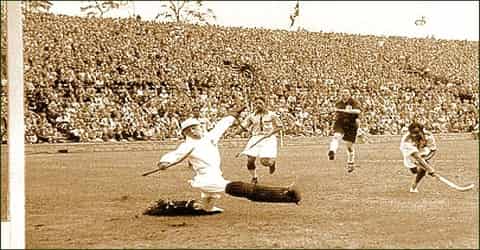
Adolf Hitler, the German dictator supposedly offered Dhyan Chand a higher post in the German Army than the one he was holding in the Indian Army, but he politely denied the offer.
There have been many erroneous media reports over the years claiming that Dhyan Chand scored 6 goals in India’s 8–1 victory over Germany in the 1936 Olympic final. In his autobiography Goal! Chand wrote:
“When Germany was four goals down, a ball hit Allen’s pad and rebounded. The Germans took full advantage of this and made a rush, netting the ball before we could stop it. That was the only goal Germany would score in the match against our eight, and incidentally, the only goal scored against India in the entire Olympic tournament. India’s goal-getters were Roop Singh, Tapsell and Jaffar with one each, Dara two and myself three.”
The International Hockey Federation records also attribute only 3 of the 8 goals to Dhyan Chand in the Berlin Olympic final. The final was included in the Leni Riefenstahl film on the 1936 Olympics, Olympia. Overall, in 3 Olympic tournaments, Chand had scored 33 goals in 12 matches.
Chand kept playing till the age of 42 years and retired from the game in the year 1948. Dhyan Chand met Don Bradman, the Cricket Maestro at Adelaide in the year 1935. After watching him play Hockey, Bradman commented: “He scores goals like runs in Cricket.”
After returning from Berlin, Chand joined his regiment. Between 1936 and the commencement of the War in 1939, he largely confined himself to army hockey, with one visit to Kolkata to take part in the Beighton Cup tournament in 1937. before the Beighton Cup, Chand spent four months in a military camp in Pachmarhi to attend military classes. On 16 March 1938, he was made a Viceroy’s Commissioned Officer (VCO; the equivalent of the present-day junior commissioned officer) with the rank of jemadar (now termed naib subedar). With the increasing need for qualified officers during wartime, he was promoted to acting subedar by July 1942 and to the war-substantive rank by early 1943. On 9 April 1943, Chand received an emergency commission as a second lieutenant in the 14th Punjab Regiment, with the war-substantive rank of lieutenant from the same date.
Chand continued playing hockey till the late 1940s and retired from the army as a Major in 1956. He became a coach after his retirement.
In 1947, the IHF was requested by the Asian Sports Association (ASA) of East Africa to send a team to play a series of matches. The ASA made a condition that Chand should be included in the team. Once again, Chand was chosen as captain. The team assembled in Bombay on 23 November 1947, and reached Mombasa on 15 December and played 9 matches in British East Africa winning all. Chand, though now in his forties, still managed to score 61 goals in 22 matches.
After returning from the East African tour in early 1948, Chand decided to gradually phase out his involvement in ‘serious hockey’. He played exhibition matches, leading a Rest of India side against state teams and the 1948 Olympic team which defeated Chand’s side 2–1, even though an aging Chand scored his side’s lone goal. Chand’s last match was leading the Rest of India team against the Bengal side. The match ended in a draw after which the Bengal Hockey Association organized a public function to honor Chand’s services to Indian hockey.
In 1956 Chand retired from the army with the rank of major. His son, Ashok Kumar Singh, was a member of India’s Olympic field hockey teams in the 1970s and scored the winning goal in the 1975 World Cup championship.
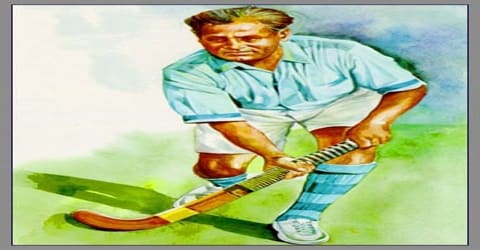
The last days of Dhyan Chand were not very happy, as he was short of money and was badly ignored by the nation. He developed liver cancer and was sent to a general ward at the All India Institute of Medical Sciences (AIIMS), New Delhi.
Awards and Honor
In 1951 Dhyan Chand was honored at India’s National Stadium with the inaugural Dhyan Chand Tournament, which he attended to the admiration of the spectators.
He was part of the Indian hockey teams that won three Olympic gold medals in field hockey in 1928, 1932 and 1936. Over his sporting career, he had scored more than 1,000 goals out of which 400 were international ones.
For his extraordinary services to the nation, the Government of India celebrates Dhyan Chand’s birthday (29th of August) as National Sports Day. The Indian Postal Service issued a postage stamp in his memory, and the Dhyan Chand National Stadium at New Delhi has been named after him. He was honored by the Padma Bhushan award by the Government of India in the year 1956.
The 20th National Award 2012, the Gem of India, awarded by the Union Minister of India, was given to Dhyan Chand. The award was received by Dhyan Chand’s son, Ashok Dhyan Chand (a hockey Olympian in his own right) on behalf of his deceased father. The award was given by Journalist Association of India under the flagship of Journalists Federation of India, Sirifort Auditorium, New Delhi, India, on 22 September 2012.
Death and Legacy
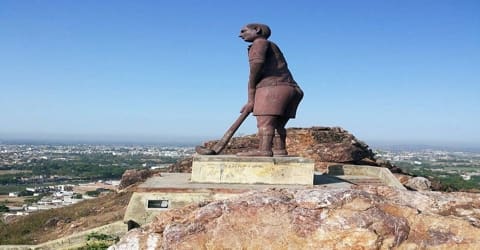
(Dhyan Chand statue at Sipri hill, Jhansi)
Dhyan Chand suffered from liver cancer and died in 1979 at the age of 74, at the All India Institute of Medical Sciences, Delhi. He was cremated at the Jhansi Heroes ground in his hometown, after some initial problems in getting clearance. His regiment, the Punjab Regiment, accorded him full military honors.
A statue of this hockey legend with four hands and four sticks was erected in Vienna depicting his master control over the ball.
India’s highest award for lifetime achievement in sports is the Dhyan Chand Award which has been awarded annually from 2002 to sporting figures who not only contribute through their performance but also contribute to the sport after their retirement. The National Stadium, Delhi was renamed Dhyan Chand National Stadium in 2002 in his honor. A hostel at Aligarh Muslim University, of which he was an alumnus, has been named after him.
Dhyan Chand was among the nominees considered for India’s highest civilian award, Bharat Ratna, for 2014 and there was support for it. The award was then given to Sachin Tendulkar and C. N. R. Rao. The family members of Dhyan Chand were disappointed with the government decision. The RTI was filed which suggested that the Prime Minister’s Office had ignored the recommendation from sports ministry on giving the award over Sachin Tendulkar.
Information Source:
